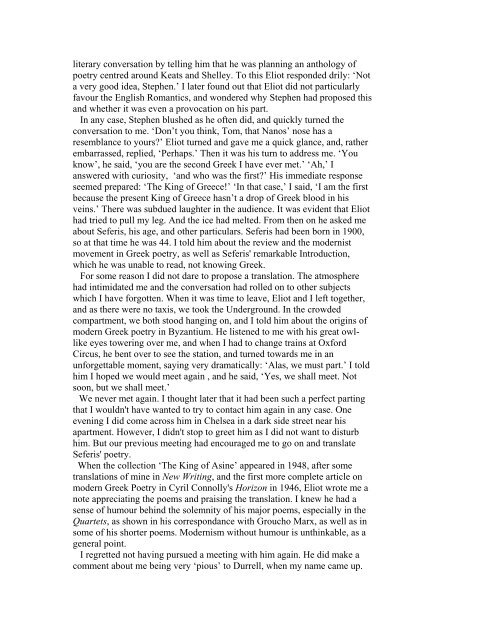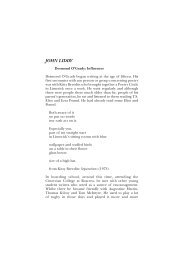Nanos Valaoritis A Memoir When I arrived in London in ... - Agenda
Nanos Valaoritis A Memoir When I arrived in London in ... - Agenda
Nanos Valaoritis A Memoir When I arrived in London in ... - Agenda
You also want an ePaper? Increase the reach of your titles
YUMPU automatically turns print PDFs into web optimized ePapers that Google loves.
literary conversation by tell<strong>in</strong>g him that he was plann<strong>in</strong>g an anthology of<br />
poetry centred around Keats and Shelley. To this Eliot responded drily: ‘Not<br />
a very good idea, Stephen.’ I later found out that Eliot did not particularly<br />
favour the English Romantics, and wondered why Stephen had proposed this<br />
and whether it was even a provocation on his part.<br />
In any case, Stephen blushed as he often did, and quickly turned the<br />
conversation to me. ‘Don’t you th<strong>in</strong>k, Tom, that <strong>Nanos</strong>’ nose has a<br />
resemblance to yours?’ Eliot turned and gave me a quick glance, and, rather<br />
embarrassed, replied, ‘Perhaps.’ Then it was his turn to address me. ‘You<br />
know’, he said, ‘you are the second Greek I have ever met.’ ‘Ah,’ I<br />
answered with curiosity, ‘and who was the first?’ His immediate response<br />
seemed prepared: ‘The K<strong>in</strong>g of Greece!’ ‘In that case,’ I said, ‘I am the first<br />
because the present K<strong>in</strong>g of Greece hasn’t a drop of Greek blood <strong>in</strong> his<br />
ve<strong>in</strong>s.’ There was subdued laughter <strong>in</strong> the audience. It was evident that Eliot<br />
had tried to pull my leg. And the ice had melted. From then on he asked me<br />
about Seferis, his age, and other particulars. Seferis had been born <strong>in</strong> 1900,<br />
so at that time he was 44. I told him about the review and the modernist<br />
movement <strong>in</strong> Greek poetry, as well as Seferis' remarkable Introduction,<br />
which he was unable to read, not know<strong>in</strong>g Greek.<br />
For some reason I did not dare to propose a translation. The atmosphere<br />
had <strong>in</strong>timidated me and the conversation had rolled on to other subjects<br />
which I have forgotten. <strong>When</strong> it was time to leave, Eliot and I left together,<br />
and as there were no taxis, we took the Underground. In the crowded<br />
compartment, we both stood hang<strong>in</strong>g on, and I told him about the orig<strong>in</strong>s of<br />
modern Greek poetry <strong>in</strong> Byzantium. He listened to me with his great owllike<br />
eyes tower<strong>in</strong>g over me, and when I had to change tra<strong>in</strong>s at Oxford<br />
Circus, he bent over to see the station, and turned towards me <strong>in</strong> an<br />
unforgettable moment, say<strong>in</strong>g very dramatically: ‘Alas, we must part.’ I told<br />
him I hoped we would meet aga<strong>in</strong> , and he said, ‘Yes, we shall meet. Not<br />
soon, but we shall meet.’<br />
We never met aga<strong>in</strong>. I thought later that it had been such a perfect part<strong>in</strong>g<br />
that I wouldn't have wanted to try to contact him aga<strong>in</strong> <strong>in</strong> any case. One<br />
even<strong>in</strong>g I did come across him <strong>in</strong> Chelsea <strong>in</strong> a dark side street near his<br />
apartment. However, I didn't stop to greet him as I did not want to disturb<br />
him. But our previous meet<strong>in</strong>g had encouraged me to go on and translate<br />
Seferis' poetry.<br />
<strong>When</strong> the collection ‘The K<strong>in</strong>g of As<strong>in</strong>e’ appeared <strong>in</strong> 1948, after some<br />
translations of m<strong>in</strong>e <strong>in</strong> New Writ<strong>in</strong>g, and the first more complete article on<br />
modern Greek Poetry <strong>in</strong> Cyril Connolly's Horizon <strong>in</strong> 1946, Eliot wrote me a<br />
note appreciat<strong>in</strong>g the poems and prais<strong>in</strong>g the translation. I knew he had a<br />
sense of humour beh<strong>in</strong>d the solemnity of his major poems, especially <strong>in</strong> the<br />
Quartets, as shown <strong>in</strong> his correspondance with Groucho Marx, as well as <strong>in</strong><br />
some of his shorter poems. Modernism without humour is unth<strong>in</strong>kable, as a<br />
general po<strong>in</strong>t.<br />
I regretted not hav<strong>in</strong>g pursued a meet<strong>in</strong>g with him aga<strong>in</strong>. He did make a<br />
comment about me be<strong>in</strong>g very ‘pious’ to Durrell, when my name came up.




